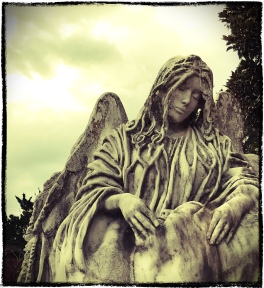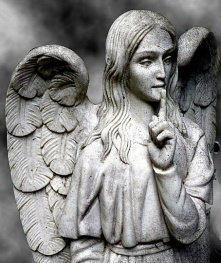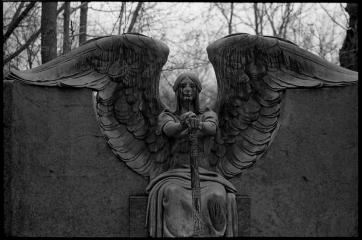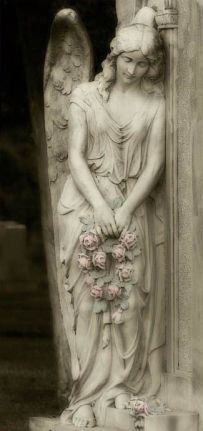I once read an essay (now long lost) that suggested Catholic Horror writers wrote better Horror…
I don’t remember the argument or the examples, but the question has stayed with me well past my own conversion to Catholicism. I deny, of course, that I converted for the Horror. But it is fun to say. And it also means this is a question that has dogged my reading and writing career.
Is it true? Do Catholics write better Horror? And more importantly, does what you believe affect not only choices you make in writing Horror, but the quality of the stories you tell?

The Question of Faith
One of the most interesting facets of Horror fiction is that it perpetually asks: what is the relevance of faith?
Modern characters are often nonreligious, agnostic or atheistic, and are left defenseless to confront the evils of the world – up to and including the demonic – all without the slightest understanding of the immensity of the situation. This is a blessing to Hollywood, which gets to explore all manner of special effects on the way to the protagonist’s discovery that whatever it is, it is directly from Hell, and there is no cure for the evil coming for them…
And it makes things easier for the writer, who doesn’t have to worry about knowing obscure and arcane facts, who can “learn” right along with their characters, and who can feel equally “safe” in making up solutions that eliminate or “postpone” the problem – even if it means passing the evil onto someone else – preferably a minor antagonist who “deserves” it.
Fortunately or unfortunately, we have all manner of “reality” ghostbusting television shows to thank for replacing that void which not only religion, but folk and fairy lore used to occupy. We can refer or defer to them as the “authority” on how supernatural things happen, and even lessen the importance of why.
We are innocent, after all – all of us. We never, ever deserve the evil that roams the world as punisher.
But isn’t this delivery of supernatural fiction from a position of ignorance the reason modern Horror is more two dimensional than ever? Do we need a belief system in order to “dress” the details of a real religious crisis?
Is the problem that we no longer believe in a real religious crisis?
I have wondered about this for a long time – especially since I left my own Protestant church with a crisis of faith about the same time that a good deal of mainstream America was doing the same – the 1970’s. And one has only to ask “what are the main Protestant denominations today?” to see what the national restructuring of faith resulted in – a loss of consistency, a loss of definable doctrine greater than sola scriptura – or God’s Word alone.
Yet the Catholic Church was not immune from parishioner defection.
Everyone, it seemed, was having a crisis of faith – not only at the time when science and technology was again on the rise – but at the time when a U.S. President could be assassinated, when a Civil Rights leader could be murdered in the light of day, when our own government was caught in lies that went back centuries, and the first cracks in the American Dream became visible.
Pair that with the teenage years of the Baby Boom generation, and there was a whole lot of questioning going on. And churches of all faiths were caught unaware and reacted with indignant shock.

But this never meant we stopped craving religion, or some proof of it.
And for that proof, we cast our gaze to the very thing that robbed us of our faith: evil…the kind of evil that seems in its tenacity and freedom from judgment to run rampant in the world, savaging humanity without an apparent comment from God.
Why is God silent, if indeed he is there?
The question has haunted generations of agnostics who want more, of atheists who require tangible proof to believe more, and of the faithful who kneel in churches in the face of tragic events. And where Literature has long explored the theme, Horror has reveled in it.
Clearly humanity needs an answer, if not God Himself. We would not ponder and debate the question of His existence if we did not need Him in the most primal way – ask any psychologist, sociologist, or priest.
Faith is the scab over the old wound that never heals, the one we pick at, and point at, and deride others about for choosing faith, or choosing no faith, or the wrong faith.
Of course in our genre, we get to take matters of religion to the extremes. But we do so because the question of faith is that important to us – whether as witnesses to human arrogance, or as victims of those seeming above any laws. Clearly we need to know there is judgment of some sort… and if we can’t get God to respond, we will turn to the Devil.

The Devil as Default
We have long sought out evil in an attempt to flush out God.
It is the most basic attempt to tease God out of Heaven, to prove His existence to us, and more importantly, to prove our worthiness, our special place in His universe.
But we have also done so by placing evil in the laboratory and under the microscope in the hope of understanding ourselves – if not excusing ourselves.
Says Susan Neiman in her book Evil in Modern Thought: an Alternative History of Philosophy (New Jersey: Princeton University Press, c2002): “Exploring evil as historical phenomenon becomes part of our efforts to make the world more comprehensible in theory and acceptable in practice” (Neiman 44).
Knowing how to recognize evil might offer us the opportunity to eradicate it, to give us hints on how to avoid its demonic gaze. So we attempt to define it by assigning categories of human behavior to it.
The irony is not lost on Horror writers, who often then weave the demonic right back into humanity. Who’s the Devil here? And why isn’t Satan the perfect vehicle for all of our troubles?
The answer is: because if we believe in the Devil, we are also wont to believe in God. And today, that equates for many to simple superstition.
But then Horror asks (when it is really good Horror)… what if religion is real?
As though such a question represents the purist, the most preachy among us, bad or weak Horror has therefore grabbed onto the Devil by his horns and thrust him into every subgenre and every trope sacred to our genre as though to ward off any further questions.
Today it is never just a witch, but the Devil’s personal favorite. It is never just a ghost but a demon from the Devil’s right hand. It is never just a werewolf but a personal brush with a hound from Hell. It is never just a mass murderer but one possessed. It is never just a vampire, but one bewitched by the witch who is the Devil’s personal favorite… and so it goes… ad nauseum.
Today, evil just IS…
We have no real relation to it, other than to be an innocent victim of it.
Whether we are trying to explain a terrorist act or a weak fiction plot, it is just easier to drag the Devil into it. It gives us permission to become hapless victims and righteous soldiers. Says Neiman, “Belief in Providence presumes that we are innocent long after we’ve begun to look very suspicious.” (199)
We have completely missed the message of evil.

The Exorcist and the Battle of Good and Evil
Of course, Horror took up the challenge. And the reasons for the success of William Peter Blatty’s The Exorcist is not only why we have some pretty awesomely scary Horror to look back on today, but it is also why modern writers stay away from religious questions almost entirely in contemporary Horror fiction.
Blatty, it appeared, went just a little bit too far… not in his monster –the Devil was great in this on (and was even able to send his right hand demon for one of the first times in modern Horror fiction and as a result it was unique, and a worthy surprise for Horror audiences and lapsed Christians everywhere) – but because Blatty made the mistake of not letting the story speak for itself.
As Horror Critic S.T. Joshi says, “the sole function of his writing is to reconcile us to Catholicism…” (Joshi 61)
Blatty framed his characters in the exact moment of time in which we were living: many Americans in 1971 were no longer members of any church, even when we considered ourselves to be Christian. A growing segment of the population were self-identifying as agnostic, and many others of us were flirting with atheism while embracing our pseudo-enlightenment, rejecting the beliefs of our parents who we were coming to see as parochial and even ignorant. To a Catholic writer like Blatty, something needed to be done to herd us all back to the fold… to revisit the issue and necessity of faith.
While it is not so obvious in the film, the book reveals more of his intent… seeming “preachy” while it attempts to take a skeptical, modern reader and explain how true evil has no scientific explanation, and no solution other than what God can provide through established religion and faith. Says Joshi, “Blatty so insistently pushes his theology in our faces” that it virtually bankrupts any aesthetic value of his work (Joshi 61).
This is a consequence of Blatty’s attempt to demonstrate – much to many readers’ chagrin – that the atheistic mother of the possessed child has no choice but to exhaust all of the “logical” and “scientific” explanations for possession until the character must in abject desperation concede that only God and her reclaimed faith can save her child.
This is exactly where we all were with religion: we did it if we did it once a week, and the rest of the time we were duly enlightened.
In the book, there is the usual parade of psychiatrists, medical doctors, medications and therapies which because of our modern resistance to the metaphysical, must be explored in order to prove their irrelevance to the supernatural problem. We must be made to see ourselves in our faithless world, too busy and too oblivious to consider the truth that humanity is the unwavering target of evil. And indeed, the reader goes on this very tedious journey with her.
Blatty’s purpose, of course, is to show that true religious events are matters of faith – not science.
And to some degree, he succeeded. The message was not lost on many Catholics. And the possibility of demonic possession delivered upon an innocent child led many Protestants to rethink their baptism-as-lifetime-guarantee position. But it did not drive us all back into the pews. Instead, it ushered in the New Age and a re-visitation of spiritualism and tinkering with the arcane.
It also led to a certain reluctance among Horror writers to write anything which would label them as “preachy.” And so began the mad dash to found footage and staring for hours at empty rooms in the hopes of seeing a swinging chandelier or a door closing ever so slowly… the Devil became the default explanation for everything that could go wrong in a Horror novel.
But ironically, we seem to prefer that the Devil cannot be defeated…
We just don’t seem to want to believe in a God who makes us discover faith in a room full of demons.
We don’t want to bring in Christianity.
We don’t want anything that reeks of superstition to taint our big boy Rambo image, so we feign ignorance of religion and make the secret rites of the Catholic Church a rental option.
Fix and forget it. That’s our modern motto.
Never mind that our robotic obsession with living in a bubble might be abnormal, and the battle between good and evil, the normal. That would be too scary….and preachy.
It seems sad to me that we have ignored the greater message which does persist behind Blatty’s desire for a mass return to faith: that some things are just beyond our control because maybe-just-maybe we are not the center of the universe after all.
Yet we struggle with the concept of anyone – God or exorcist or deliverance minister – being the final answer to our problems. We are, it seems, too great a set of control freaks to let that be a default in our fiction. We’d rather just have the demon who cannot be completely banished, the mystery we cannot completely uncover. So we hide behind extinct or obscure cultures, and – if all else fails – we make things up.
This is true for Catholics and Protestants alike. Yet… do we write differently because of our own intimate beliefs?

Catholics, Protestants, and Atheists… Oh My!
Horror has always consisted of a diverse field of writers.
With regard to that essay I referenced at the beginning, I have not found one religious (or nonreligious) persuasion to be better or more prolific than another.
Do I think a belief system or lack of one influences writers of Horror? Definitely yes: whether we write to obscure or promote our own beliefs, or in fear of having those beliefs ridiculed or to spite our parents or Critics, or because we do not believe in one religion or in perhaps even in God, religion cannot help but impose its shadow upon our genre.
Do I think it makes us better or worse as writers?
I think the temptation to overreach is there, whether a writer subconsciously mocks or feels mocked or anticipates mockery. Religion must be entered into “just so” in our genre, lest it spoil the tale. As a result, our very personal position on religion or lack of it can affect our work for better or worse.
But I don’t think it is the determiner of our fates as Horror writers…although perhaps it will contribute something to style.
For example, in Horror, we have the Reformation to thank for separating the ways Protestants and Catholics look at the supernatural, starting with ghosts. Says Gillian Bennett in an introduction to the Seventeenth Century chapter of her book The Best 100 British Ghost Stories:
“Catholics and Protestants agreed that the souls of bad people would not be allowed to escape from Hell and the souls of good people would not wish to leave Heaven. The only place restless spirits could be coming from was therefore Purgatory, which was conceived of as a sort of holding pen where souls could be purged of sin. It followed that if there was no Purgatory, there could be no ghosts; but if ghosts could be proved to exist, the existence Purgatory was confirmed.” (Bennett 15)
Therefore Catholics believed in ghosts, Protestants did not. Toss in the modern reluctance to consider ghosts to be anything other than demons imitating loved ones to gain access to the soul, and we lose Catholics as well…but only publicly.
In private, we all ponder the existence of ghosts, and even play at “busting” them.
Yet our religious training in where we place them and whether they are or ever were human changes the way we write ghosts and demons and influences the belief of whether or not they can or should be driven to Hell…right along with who has the religious authority to do the driving…
So yes, our religious beliefs can and do affect how we tell a tale.
As an observer, I also believe Catholics are wont to write “deeper” in the area of religious problems like death and grief, ghosts and possession. I think the possibilities that await those who stray too far from God hold a certain terror for Catholics that Protestants do not anticipate or seem willing to entertain, and maybe that has to do with our early religious upbringings. But I think Protestants write better modern characters and situational Horror. And I think atheists write better Weird and subversive monsters than any of us.
Indeed, most of Weird fiction’s prominent and founding writers have been atheists according to Joshi. And many supernatural/spectral writers are Catholic. And of course many of todays’ giants are Protestants. So while religion or lack of it is most certainly an influence, it is not an indicator of success or failure – only a comfort zone for the kind of monsters we choose to write.
Most of us writing in Horror have lapsed in our faith a time or two, whether we were able to translate our own mystic fears and worldviews into our fiction or not, whether we eventually abandoned it altogether or not. It is the nature of the Horror genre that we question reality and our place in it. So it is also natural that we question surreality and its place in our world, that we poke at boundaries and wonder about it if something dares poke back.
Horror is not and should not be about driving the masses back into the arms of a loving God or into experimenting with the supernatural or declaring ourselves proudly above religion entirely. But it is about allowing ourselves the right to believe… even if it is only long enough to drive a demon out of this world, or to experience the what if of the moment.
It is about questioning, and sometimes…discovery – even discoveries we didn’t want to make and don’t know what to do about.
Not because Catholics or Protestants or atheists might write better Horror fiction, but because if the monstrous unseen really is out there, then the monstrous human is not the worst thing to worry about. And whether religion is superstition or not, some of us would rather not contemplate a world where we are completely, excruciatingly alone.
After all, there would be no one left to read our work…

References
Bennett, Gillian. The 100 Best British Ghost Stories. Gloucestershire, Great Britain: Amberly Publishing, c2012.
Joshi, S.T. The Modern Weird Tale. Jefferson, NC: McFarland & Company, Inc. c2001.
Neiman, Susan. Evil in Modern Thought: an Alternate History of Philosophy. Princeton, NJ: Princeton University Press, c2002.

Once again, you write a compelling and deeply intellectual essay. I hope you plan on writing a book on horror someday.
LikeLiked by 2 people
I actually have thought about it since I have had to resort to my own research to get both answers to my own questions and peripheral musings! Thanks once again for the compliment!
LikeLiked by 1 person
Reblogged this on charles french words reading and writing and commented:
KC Redding-Gonzalez writes an excellent and engaging essay about the connection of belief and horror fiction.
LikeLiked by 1 person
Thank you again, Professor!
LikeLike
Interesting. People have said that one of the unique things about the gothic novel is how you can pin down its start point to Horace Walpole’s Castle of Otranto (1764). I would add that for at least 50 years the genre was caught up in the Protestant/Catholic turmoil of 18th-century England. From Walpole to Anne Radcliffe and Matthew Lewis, gothic fiction was arguably a generic attack on Catholic superstition and moral corruption … but push the devil out of the front door and he comes in at that back. Evil or not, the supernaturalism associated with the Catholic villains turns out the be true in most of the novels. So the Protestant fascination with Catholic mystery persists even when they are ostensibly villifying Catholic culture. Food for thought anyway 🙂
LikeLiked by 2 people
Great point… I am always perplexed that when protagonists need help, it is time to call in the Catholics!
LikeLiked by 1 person
KC, what a fantastic essay and it is greatly intellectual, could be a book here. I have always wondered about this subject, and you put it in words that are so rational and intriguing. Great work. Awesome! KD 🙂
LikeLiked by 1 person
I’m going to get a big head with all of this praise. And then I’ll have to go to confession. But thank you just the same! This one has been bugging me for years andI think I kept hoping someone else would write about it…
LikeLiked by 1 person
I love your writing and your thinking, as you are asking more questions rather than giving answers. Terrific!
LikeLiked by 1 person
I find that is the way it works… The more you know, the more you want and need to know! Too bad none of the editorial authorities enter into the discussion these days… although with less of them, time is harder to come by I am sure. Even Horror forums don’t look at the genre and discuss issues. Hence, the Dead Salmon awoke!
LikeLiked by 1 person
And thank goodness it awoke! My 8th grade teacher told me, “The more you know, the more you know you don’t know.” Just like you said. 🙂
LikeLiked by 1 person
We certainly are molded by our education and physical influences on our lives while we grew up. Growing up in the ghetto or a posh military school prepares a mental banquet having extreme opposites to work from. You make a very good point about someone or faith writing horror stories or modern-day fiction. It surely is a different version than a couple of generations ago. I enjoy your perspective on writing thank you very much for sharing.
LikeLiked by 1 person
And thank you for both the compliment and reading, Mr. Hoel! I only wish we could learn to value each other’s background-shaped opinions more… It is, after all, our diversity which helps us make better decisions — be they about international affairs or writing a Horror story…
LikeLike
You hit the old nail right on the head, you are so correct about others opinions. That is why the country is split down the middle, everyone is so in love with self and their own ways and ideas. It is either my way or the highway, working together is not part of the picture anymore. That is too bad. The politicians are a direct image of society, either me or nothing with far too many people.
LikeLiked by 1 person
You are so correct, Mr. Hoel! We haven’t figured out it is ok that we all think differently, and to listen to the other side because the other side is listening back, and no one is denigrating the other…Instead, it has become everyone’s job to tell everyone else how stupid they are — never noticing that the politicians like it this way — except when it hits them square in the legislation. It’s time we re-learn manners and civility — and that means respecting each other even if you want to label it political correctness. We have far too much to lose to rule our country like three-year-olds. Maybe if we started remembering what our veterans have fought for through every war — even when they were lied to outright. THAT is our example. THOSE people know a thing or two about respect.
LikeLike